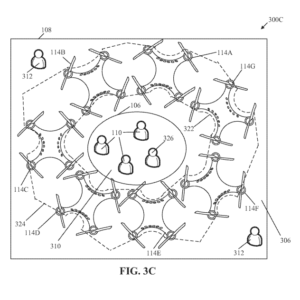
From the patent:
“In certain situations of open areas (for example, restaurants, party places, parks, etc), it may be difficult to get the soundproof fixed infrastructure instantly to initiate a verbal communication (such as telephonic call, a conversation with nearby person). Further, the verbal communication or sound reproduction performed in the open areas may create a disturbance or nuisance for neighboring people. Thus, an advanced and intelligent system may be required which may provide a soundproofing solution on a real-time basis.”
“This invention seeks to enable a means of having a virtual noise cancellation barrier through a networked system of drones,” write John DeStefano, Founders Technical Advisor
and Lauren Hawksworth, Marketing Administrator. “The drones are equipped with the necessary audio equipment needed to cancel out the ambient noise of the environment and provide the users within the virtual barrier a noise-free zone.”
A mobile quiet zone could have almost endless uses. In loud industrial environments like factories or construction sites, creating a quiet work zone could be incredibly valuable: or, simply imagine a quiet “phone call zone” set up in busy malls, trade shows, or public events. “The ability to create a virtual noise barrier can be leveraged in many different ways and is sure to be widely implemented once the technology has matured enough,” says the Founders article.
The invention, which Founders says is “very complex,” involves flying a fleet of interconnected drones carrying a payload of speakers. Part of the invention involves Sony’s method of fleet control. “These interconnected drones know where to go based on an image processing algorithm. The algorithm identifies the predefined 3D area from a real-time image data feed and sends corresponding commands to the connected drones to position them correctly,” says the article. “Through the use of the real-time feed, the fleet of drones is capable of following specific targets to provide a continual zone of noise cancellation.” It’s a unique use for “follow-me” capabilities: and as fleet capabilities develop throughout the industry, Sony’s method could prove to be an advancement.
Using the drones for noise cancellation is a new application idea. The drones carry speakers: “Once the drones have been properly positioned, they use their audio capture abilities to process the ambient sound in a given area. The speakers equipped with the drones are then capable of creating audio signals that cancel the processed ambient noise resulting in virtual noise cancellation boundary.”
It’s one more use for commercial drones that could provide value in a wide variety of sectors. Could Sony’s noise cancellation drones follow commercial delivery drones to ensure that communities don’t experience drone noise?

Miriam McNabb is the Editor-in-Chief of DRONELIFE and CEO of JobForDrones, a professional drone services marketplace, and a fascinated observer of the emerging drone industry and the regulatory environment for drones. Miriam has penned over 3,000 articles focused on the commercial drone space and is an international speaker and recognized figure in the industry. Miriam has a degree from the University of Chicago and over 20 years of experience in high tech sales and marketing for new technologies.
For drone industry consulting or writing, Email Miriam.
TWITTER:@spaldingbarker
Subscribe to DroneLife here.